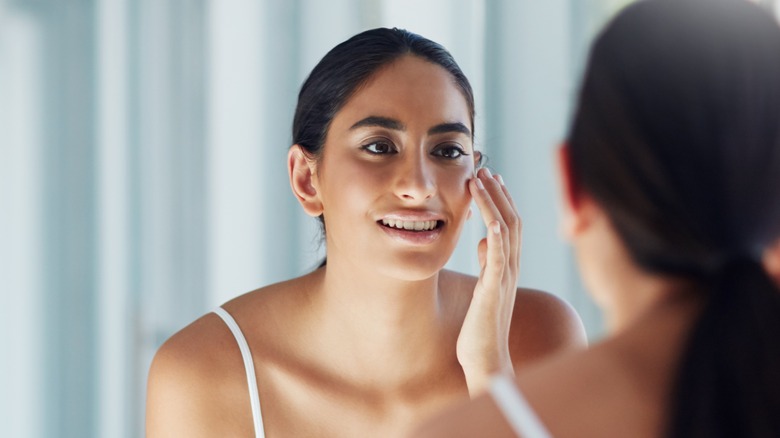The Unexpected Oil To Add To Your Diet For Hair, Skin, And Heart Health Benefits
Plenty of foods contain nutrients that enable them to benefit you in more than one way. And oils can sometimes fit into that category. In fact, there's one oil that's especially good for your skin, your scalp, and your cardiovascular system.
Pumpkin seed oil may only land on your radar during the "everything pumpkin" autumn, but it is available all year. Extracted from pumpkin seeds through a multi-step process that can take weeks, the oil tends to be a deep green. Its nutty overtones are strong enough to notice, especially when it's eaten raw (and pumpkin seed oil makes a tasty substitute for olive oil). Yet pumpkin seed oil isn't just for consumption; it can be used topically as well to moisturize and calm inflamed areas of skin.
Pumpkin seed oil has shown promise in being able to combat itching, burning, and other symptoms of eczema. (According to a dermatologist, these are the top 3 signs you may have eczema.) A 2020 study in the Iranian Journal of Public Health found that after applying a pumpkin-based ointment on their hands for 28 days, participants reported a reduction in the severity of their eczema.
Possible acne and hair loss treatment
Pumpkin seed oil may be a potential treatment for acne, too. According to a 2018 study in Applied Science Reports, after applying pumpkin seed oil on their facial acne for three months, adult subjects reported that their breakouts had lessened by 84%. But what if your physical concerns aren't related to eczema or acne, but are based on consistently thinning hair? In that case, you may find that ingesting pumpkin seed oil helps your luscious locks stick around longer by combatting a receding hairline.
In an interview for Cleveland Clinic, dermatologist Dr. Wilma Bergfeld noted that pumpkin seed oil supplements could lower testosterone levels. Since elevated testosterone has been linked to hair loss, keeping it at normal levels could stave off baldness. But Dr. Bergfeld cautioned that "it can be a long process before you can really notice new growth." So it may take a while before you notice changes in the thickness of your hair.
Healthy hair and heart effects
If you'd rather not take pumpkin seed oil supplements for hair improvements, you could try pumpkin seed oil topically as an all-natural hair loss therapy. You might even see a difference in a much shorter timeframe than if you tried supplements.
A 2019 study in the Avicenna Journal of Phytomedicine observed that it only took three weeks for hair to begin growing on mice that had hair removed using a depilatory cream and were then treated with topical pumpkin seed oil. Meanwhile, a 2021 study in the Journal of Cosmetic Dermatology on human subjects produced a similar outcome, but took longer to produce results. After topically applying pumpkin seed oil on areas of female-pattern baldness for three months, female participants saw just as much hair growth improvement as their peers who used an approved topical medical treatment.
Additionally, pumpkin seed oil may decrease your risk of heart disease. A 2019 trial in Complementary Therapies in Clinical Practice noted that after six weeks of taking 3 grams of pumpkin seed oil daily, postmenopausal women in the trial significantly reduced their systolic blood pressure readings. A 2025 review in the Pakistan Journal of Health Sciences investigated the source of pumpkin seed oil's cardioprotective properties. The review concluded that the antioxidants, micronutrients (including magnesium), and other beneficial compounds in pumpkin seed oil make it worth considering as part of a heart-healthy, anti-chronic disease diet.


